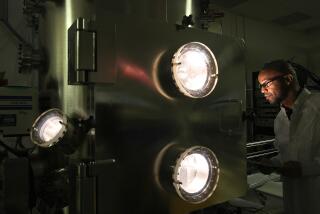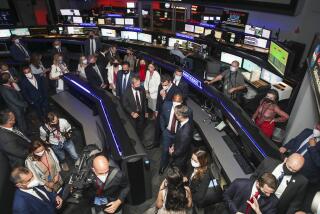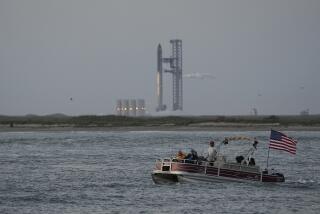NASA awards millions to four firms to privately develop rockets and spacecraft
With NASA’s fleet of aging space shuttles set for retirement at the end of the year, the space agency is looking for a new way to carry astronauts.
On Monday, NASA handed out $269.3 million to four companies to privately develop rockets and spacecraft for what could be the next step in manned spaceflight.
The winners included Hawthorne-based rocket maker Space Exploration Technologies Corp., or SpaceX, and Boeing Co., which develops spacecraft in Huntington Beach and uses rocket engines made by Pratt & Whitney Rocketdyne in Canoga Park.
The other two awards were $22 million to Blue Origin, a closely held space venture in Kent, Wash., that is owned by Amazon.com founder Jeff Bezos, and $80 million to Sierra Nevada Corp. of Sparks, Nev.
After the shuttle program is mothballed and before privately built space vehicles are astronaut-ready, the U.S. will have no way to travel to the International Space Station other than shelling out $63 million for rides on a Russian Soyuz rocket.
“We’re committed to safely transporting U.S. astronauts on American-made spacecraft and ending the outsourcing of this work to foreign governments,” NASA Administrator Charles Bolden said in a statement.
The new contracts awarded Monday “are significant milestones in NASA’s plans to take advantage of American ingenuity to get to low-Earth orbit, so we can concentrate our resources on deep space exploration,” he said.
The awards are part of NASA’s Commercial Crew Development program, which lays the groundwork for the potentially multibillion-dollar job of ferrying astronauts to and from the International Space Station. NASA is also providing seed money to these companies to compete and create a new private space race.
“Competition is a very important part of our strategy,” Philip McAlister, NASA’s acting director of commercial spaceflight development, said in a teleconference with journalists, indicating that 22 companies went after the funding.
Boeing engineers in Huntington Beach and Houston are working to develop a seven-person spaceship that is designed to fly atop a variety of rockets. The company won $92.3 million, the largest of the four awards, and expects the spacecraft to be ready by 2015.
The spaceship, dubbed the Crew Space Transportation-100, had received just $18 million in government investment thus far. Boeing’s performance “is an example of how the company’s innovative and experienced team is successfully partnering with NASA in a commercial environment,” Boeing program manager John Elbon said in a statement.
Of the winners, SpaceX is the only company to have its contender spaceflight-proven.
In December, SpaceX became the first private company to launch a spacecraft into orbit and have it return intact. The company sent up its Apollo-like Dragon space capsule aboard its 18-story Falcon 9 rocket.
The Dragon capsule was empty at the time, but it was a technological and financial feat that had been accomplished before only by government entities.
The capsule is designed to carry seven astronauts, but SpaceX Chief Executive Elon Musk said it still needed upgrades before an astronaut could strap in. That’s where the funding will come in.
SpaceX won $75 million from NASA to develop its hardware. The funding comes on top of $298 million that NASA has already invested in the company. The space agency has also awarded the company a $1.6-billion contract to have SpaceX’s Dragon deliver cargo to the space station — with trips possibly starting later this year.
Ed Mango, NASA’s commercial crew program manager, said in the news teleconference that there might be more than one vehicle that will carry astronauts into space, if the market can support it. “What we’re looking for is innovation.”







